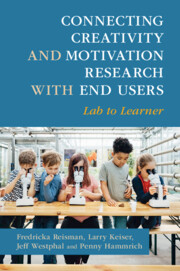Book contents
- Connecting Creativity and Motivation Research with End Users
- Connecting Creativity and Motivation Research with End Users
- Copyright page
- Dedication
- Contents
- Figures and Tables
- Modules
- Boxes
- Preface
- Acknowledgments
- Chapter 1 Translational Education Research
- Chapter 2 Creativity
- Chapter 3 Motivation
- Chapter 4 Assessment Attributes and Related Guidelines
- Chapter 5 Assessment of Creativity
- Chapter 6 Assessment of Motivation
- Chapter 7 Additional Theorists on Creativity and Motivation
- Chapter 8 Neuroscience of Creativity, Mindfulness, and Mind/Brain/Education Science
- Chapter 9 Creativity Modules
- Chapter 10 Motivation Modules
- Chapter 11 Dissemination and Communication Techniques for Translational Research
- Chapter 12 From Individual Compliance to Creative Collaboration: A Business Perspective
- Index
- References
Chapter 1 - Translational Education Research
Published online by Cambridge University Press: 08 February 2024
- Connecting Creativity and Motivation Research with End Users
- Connecting Creativity and Motivation Research with End Users
- Copyright page
- Dedication
- Contents
- Figures and Tables
- Modules
- Boxes
- Preface
- Acknowledgments
- Chapter 1 Translational Education Research
- Chapter 2 Creativity
- Chapter 3 Motivation
- Chapter 4 Assessment Attributes and Related Guidelines
- Chapter 5 Assessment of Creativity
- Chapter 6 Assessment of Motivation
- Chapter 7 Additional Theorists on Creativity and Motivation
- Chapter 8 Neuroscience of Creativity, Mindfulness, and Mind/Brain/Education Science
- Chapter 9 Creativity Modules
- Chapter 10 Motivation Modules
- Chapter 11 Dissemination and Communication Techniques for Translational Research
- Chapter 12 From Individual Compliance to Creative Collaboration: A Business Perspective
- Index
- References
Summary
Chapter 1 defines translational research and compares basic and applied research paradigms. The chapter includes Brabeck’s (2008) quote that sets out the rationale for applying the translational medical research model of bench to bedside to the authors’ translational education research model of lab to learner. The dilemma of translational research for end users and a description of the related Freddie Reisman Center for Translational Research in Creativity and Motivation (FRC) at Drexel University also are included.
Keywords
- Type
- Chapter
- Information
- Connecting Creativity and Motivation Research with End UsersLab to Learner, pp. 1 - 14Publisher: Cambridge University PressPrint publication year: 2024



